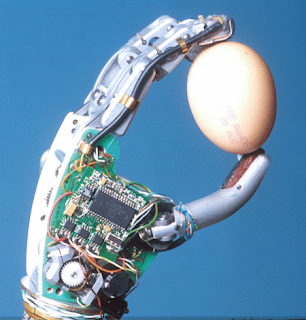
 http://latestnews.virginmedia.com/news/video/2008/08/14/rat_brained_robot
http://latestnews.virginmedia.com/news/video/2008/08/14/rat_brained_robotKevin Warwick was interviewed on Red Ice Creations Radio a few weeks ago and he seems very naïve about how Artificial Intelligence and psychotronics could be abused by authorities. You can download the interview here, but need to subscribe to hear both parts: http://www.redicecreations.com/radio/2008/06jun/RICR-080629.php . I’ve written my own article on this subject here: http://hpanwo.blogspot.com/2008/06/ai-and-new-human.html .

 I'm reading an interesting series of novels at the moment by an American author called Michael DiMercurio ( http://www.ussdevilfish.com/index01.htm ). He used to serve in US Navy submarines and now he writes novels on the subject. In his more recent books he addresses the concept of artificial intelligence used in the military. He invents an unmanned submarine called “SNARC”, which has a genetically engineered artificial biological brain running it. It is euphemistically termed a “carbon computer” while ordinary computers are called “silicon computers” to distinguish them. This brain has thoughts and feelings like any human and part of the plot is that the scientist who created it, and who helps some gangsters hijack the robot submarine, doesn't want the sub to come to any harm because he's begun to see the artificial brain as a friend. This raises an interesting question: If you could create artificial intelligence and therefore machines with thoughts and feelings just like living creatures, then you'd no longer be able to treat them as machines, as you would a car or Hoover or toaster. You'd have to consider their feelings! There would be a whole new discipline of law, robot ethics! These machines would need legal rights like animals do under today's law. Isaac Asimov addresses this question in his Robot novels. One of them was made into a film, Bicentennial Man starring Robin Williams as a robot who is unintentionally created with Artificial Intelligence, and although his mind is not entirely the same as a human one, he is undeniably conscious and self-aware. The film follows his poignant struggle to be accepted for what he is in human society ( http://www.imdb.com/title/tt0182789/ )
I'm reading an interesting series of novels at the moment by an American author called Michael DiMercurio ( http://www.ussdevilfish.com/index01.htm ). He used to serve in US Navy submarines and now he writes novels on the subject. In his more recent books he addresses the concept of artificial intelligence used in the military. He invents an unmanned submarine called “SNARC”, which has a genetically engineered artificial biological brain running it. It is euphemistically termed a “carbon computer” while ordinary computers are called “silicon computers” to distinguish them. This brain has thoughts and feelings like any human and part of the plot is that the scientist who created it, and who helps some gangsters hijack the robot submarine, doesn't want the sub to come to any harm because he's begun to see the artificial brain as a friend. This raises an interesting question: If you could create artificial intelligence and therefore machines with thoughts and feelings just like living creatures, then you'd no longer be able to treat them as machines, as you would a car or Hoover or toaster. You'd have to consider their feelings! There would be a whole new discipline of law, robot ethics! These machines would need legal rights like animals do under today's law. Isaac Asimov addresses this question in his Robot novels. One of them was made into a film, Bicentennial Man starring Robin Williams as a robot who is unintentionally created with Artificial Intelligence, and although his mind is not entirely the same as a human one, he is undeniably conscious and self-aware. The film follows his poignant struggle to be accepted for what he is in human society ( http://www.imdb.com/title/tt0182789/ )As Kevin points out in his Red Ice interview, AI would raise many philosophical questions about the nature of mind and consciousness itself. For example: would AI machines have a soul? Seeing as we are their creators does that make humans into God? Would they continue to exist after they were shut down, ie "killed"? Is there an AI afterlife? This process of "learning" is exactly what happens with the artificial brains in the Michael DiMercurio books. Although those books are set a decade or two in the future and the artificial brains are very sophisticated, matching human brains. The programmer can even talk to the AI brain and have a conversation with it as a real, conscious entity! Alan Turing would be jumping up and down with delight! Imagine that! If you ever get lonely and need a friend you can grow one in a laboratory! In the book a Russian gangster, Alexei Novskoyy, takes over the robot submarine and commands it to fire its torpedoes at an American submarine and the AI brain reacts as a human would. "Why?" it asks. "SNARC is an American submarine too"! Novskoyy then has to reason with the machine in the same way he would a real person. He has to persuade the brain that the submarine target has suffered a mutiny and been hijacked. The machine, despite its intellect, has a child-like naivety and believes him.
No comments:
Post a Comment